- Home
- Vince Flynn
Enemy of the State
Enemy of the State Read online
Thank you for downloading this Simon & Schuster ebook.
* * *
Get a FREE ebook when you join our mailing list. Plus, get updates on new releases, deals, recommended reads, and more from Simon & Schuster. Click below to sign up and see terms and conditions.
CLICK HERE TO SIGN UP
Already a subscriber? Provide your email again so we can register this ebook and send you more of what you like to read. You will continue to receive exclusive offers in your inbox.
ACKNOWLEDGMENTS
Once again, thanks to my agent Simon Lipskar for, well, everything he does. Sloan Harris for his ever steady hand on the tiller. Emily Bestler for her insight and for tolerating me when I climb on my soapbox. David Brown for tirelessly getting the word out. My mother for her unfailingly honest comments—were you smoking crack when you wrote that chapter? Ryan Steck for keeping me from losing my way in the details. My wife, Kim, for her increasingly practiced thriller eye and for everything else. And, finally, to Vince’s fans for going out of their way to make me feel welcome.
PRELUDE
Rabat
Morocco
IT was just after midnight and Rabat felt largely deserted. Prince Talal bin Musaid stared out at the densely packed residences built into the hills overlooking the city. His eye was attracted to a human outline ducking into an alley to his right, but through the glass of his Mercedes S-Class it didn’t seem real. The layer of dust covering everything, the cracked façades, the ragged laundry hung out to dry—none of it had ever been part of his existence. This was the world of the faceless masses. The people he became aware of only when they failed to do his bidding.
Four days short of his thirty-ninth birthday, his life had become a blur of private jets, beautiful women, and luxury homes. London, Monaco, Paris, New York—they were indistinguishable to him now, existing only to house the opulent nightclubs and shops that he and his companions required. Exclusive places that precious few people knew about and even fewer would ever be admitted to.
He could still be coaxed back to Saudi Arabia when family politics demanded, but more and more it was a place to be avoided. A place of bitter memories, betrayals, and reminders of a birthright stolen from him.
His driver eased onto a side street barely wide enough to allow passage, and bin Musaid looked away from the concrete tenements lining it. The boredom and disdain he normally felt when surrounded with this kind of squalor had been drowned out by excitement and anticipation. No more waiting. No more words. This overwhelming sense of exhilaration could only be generated by one thing. Action.
He slid a suitcase filled with American dollars onto his lap and felt the satisfying heft. It was the unfamiliar weight of purpose, he knew. The weight of power.
He was the nephew of King Faisal, but had never been treated with the respect that position demanded. After his parents’ untimely death, bin Musaid had been sent to Europe, where he was forced to absorb the insult of Western schooling. His teachers—many women—had not only refused to defer to his station but had lorded their authority over him in a pathetic effort to obscure their own inferior birth. They’d given him poor marks and reported back to the king with stories of women, liquor, and violence.
All of this would have been of little consequence, but Faisal sided with them—with the British infidels who mocked both the House of Saud and Allah himself. Bin Musaid had finally been called back to Saudi Arabia after a meaningless incident with a female student. She had been a typical Western whore and he had treated her accordingly, no better or worse than required. In any event, he had welcomed the opportunity to take his rightful place in the ruling class.
It was not to be, though. Instead of a respected government post, he had been shuttled into an endless series of menial tasks and obscure, low-level positions. The king spoke enthusiastically of his bright future when they were together but never took steps to make that future a reality. Betrayed by his own family, bin Musaid had finally left the country of his birth and cut ties to the degree possible without jeopardizing the flow of family money.
He knew now that none of it was of any importance. The Saudi Arabia that had rejected him was doomed. King Faisal was old and weak, a puppet of America who was losing control of the forces gaining power within his borders. He didn’t understand the true destiny of his country. Instead of crumbling and besieged, the Saudi royalty should have been taking a place at the helm of the new caliphate. It was the House of Saud’s privilege and responsibility to lead the forces of Islam as they exterminated their enemies throughout the world.
His driver leaned forward to search the darkness for a rare street sign.
“Left, you idiot,” bin Musaid said.
He’d been poring over the maps and satellite images on Google for days, anticipating this moment. They would drive straight for another kilometer, where the street would dead end. From there he would continue on foot into the dark maze of souks that climbed even higher above the city. The journey would take approximately seven minutes at a pace designed not to attract undue attention from anyone he might pass. Finally he would arrive at his destination: a nondescript apartment building where an ISIS representative was waiting.
The money in the suitcase would be used to finance a large-scale attack inside the United States—something ISIS saw as critical to advancing their already wildly successful propaganda campaign. The lone-wolf attacks that they had inspired were unquestionably glorious but lacked sufficient weight in a country where mass shootings were a daily event.
It was critical that America’s Muslims join the fight, but thus far they had been reticent—lulled into complacency by their prosperity and integration into the patchwork of immigrants and mutts that made up their adopted country. Cracks were beginning to form, though. America was already turning against its Muslim population. It just needed a final push for it to go from shunning Mohammed’s followers to isolating, attacking, and discriminating against them. When that came to pass, there would be millions of young disaffected men ready to be recruited into the army of God.
Saudi Arabia’s leadership had taken similar actions in the past. In fact, two of bin Musaid’s older cousins had been directly involved in the financing and planning of 9/11. While bin Laden had become the face of that attack, it would have been utterly impossible without the support of other powerful men familiar with America’s vulnerabilities.
The prince smiled in the darkness, remembering the video footage of the burning towers and the terrified Christians throwing themselves to their deaths. It wasn’t those glorious images that lifted his spirits, though. It was that the American politicians had known about Saudi Arabia’s involvement but had been too cowardly to take action. Instead, they had made a hasty backroom deal with King Faisal. He would crack down on the subversives and keep the oil flowing. In return, the Americans would ignore the fact that the attack had been carried out almost entirely by Saudi nationals and instead divert their people’s attention with the punishing quagmires of Afghanistan and Iraq.
Those wars and the lingering effects of the West’s financial collapse had divided the American people to a degree not seen since the Civil War. America was a wounded animal. And he had become the lion.
CHAPTER 1
Above al-Shirqat
Iraq
MITCH Rapp tried to find a more comfortable position, but none was available. His helmet was jammed against the top of the fuselage and there was something sharp poking through the mesh seat just to the right of his spine.
Not exactly the CIA’s G550, but then this aircraft hadn’t exactly been designed to ferry government VIPs. Its only purpose was the insertion of select teams behind
enemy lines, and in order to do that effectively it had to be small, fast, and stealthy. There was no pilot or cockpit, no cabin pressure or heat, and no light other than the dim glow from a computer screen to his right.
He glanced over and scanned the data it contained. Four hundred knots at 25,000 feet on a south-by-southeast heading. An infrared map moved lazily beneath the compass and numbers, tracking the ground. Near the bottom of the display, his target began to appear.
Al-Shirqat.
Despite everything he’d lived through—everything he’d done—there were very few places that held memories bad enough to make his palms sweat. In fact, only two. The place his wife had died and al-Shirqat.
A green light over the door flashed and he disconnected his mask from the aircraft’s oxygen supply, immediately reattaching it to a low-volume tank on his wingsuit. Slipping out of his chair, he sat on the carbon fiber floor and lashed a small pack between his legs. The countdown had started and he waited until the door began to retract to lower his goggles. The outside air temperature was thirty below zero and it lashed at him as he fought his way to the inky black opening. When the countdown in his earpiece reached zero, he threw himself out, struggling to maintain a stable position as he accelerated into his free fall.
After a few seconds he was steady enough to glance at the screen strapped to his wrist. Along with altitude, it indicated direction and horizontal distance to his drop zone. Not that hitting it exactly was all that critical—it was a more or less randomly chosen spot about a mile from the edge of the ISIS-controlled city. His old mentor Stan Hurley had beaten precision into him during jump training, though. Rapp could still picture the man standing in the middle of the landing circle, staring skyward.
If you don’t kick me in my head, I’m going to kick the shit out of yours.
Who would have thought he’d miss the old cuss so much?
Everything below him was dark, creating a disorienting sensation of floating in space. Saddam Hussein’s former officers were becoming increasingly prominent in ISIS leadership and with their rise came a commensurate improvement in discipline. They’d completely blacked out al-Shirqat in an effort to reduce the effectiveness of U.S. bombing runs. Worse, a few mobile SAM units were being moved around the battered streets. Their functionality was unknown, but the knowledge that they were there was enough to prompt him to jump from altitude and come in sideways.
He pulled his chute about a thousand feet above the ground, releasing the pack between his legs and letting it drop onto the lanyard connected to him. With a few deft pulls on the chute’s toggles, he came down directly on top of the planned target—a sandy knoll that offered him the high ground.
Rapp gathered the chute quickly and pulled off his goggles and helmet. He lay still for almost two minutes, listening. When he was satisfied that his arrival had gone unnoticed, he stripped down to a grimy pair of jeans and T-shirt, then dragged his pack to him.
It didn’t contain much more than a shoulder holster with a Glock and silencer, two extra mags, some dried meat, and a shovel to bury everything else. Once done, there was little that would identify him as anything more than a local Iraqi who had been caught in the desert after sunset.
Without the screen on his wrist, he was forced to use the stars for navigation. Fortunately, they were just as effective now as they had been when explorers first set out to discover the world. He followed a southerly course, rubbing at his face to remove any marks left by his goggles. Based on weeks of overhead surveillance, he didn’t expect to run into any security forces as he entered the city, but there was nothing certain in this business.
* * *
When Rapp reached the bombed-out buildings at the edge of town, he dropped to his stomach again. The men he was there for were farther toward the interior and he mentally reviewed the path through the city laid out by the Agency’s cartographers.
When he’d escaped al-Shirqat last time, he’d been posing as an American ISIS recruit. The former Iraqi general controlling the area had devised a plan to use dirty bombs to take out Saudi Arabia’s oil-producing capacity, destabilizing the world economy and leaving the Saudis vulnerable to a takeover by Islamic radicals. Rapp had managed to stop the plot, but not without the help of the local resistance.
Now the identities of those men had been discovered and ISIS was closing in on them. Most of the people at Langley thought he was crazy to come back, arguing that the risks far outweighed the rewards. And they were probably right. With one exception, the five young men Rapp was there to extract weren’t good fighters. None were much use at gathering intelligence, either. Mostly they sat around making long political speeches that the others then heartily agreed with. But when he’d needed them, they’d stepped up. Fuck if he wouldn’t do the same.
Unfortunately, that decision had forced him to put a reluctant Joe Maslick in charge of the Rabat, Morocco, operation. In the end, it was probably a good thing. The op wasn’t all that complicated and Maslick needed some command experience whether he liked it or not.
Rapp closed his eyes for a moment, acknowledging that he was just stalling. He’d hoped never to have to return to this place, going so far as to try to convince the military to mount a major assault to take back the city. Predictably, they’d pushed back. It wasn’t that they didn’t think they could do it. With U.S. support, the Iraqi army was strong enough now to recapture it. The problem was that the locals didn’t really see the Iraqi army as much different than ISIS. Just another occupying force to fight an endless guerrilla war against. Welcome to the Middle East.
Rapp stood and moved forward, slipping between two buildings and navigating by the light of a full moon. This area of town had taken a lot of battle damage and was largely uninhabited now. He’d been through it once before but hadn’t bothered to commit it to memory.
After about five minutes of generally southern travel, he came to a collapsed building with little more than the east wall surviving. It was one of the landmarks he’d identified from a photo at Langley and he turned left, cutting diagonally across a cratered square.
By the time he made it to the far side, he was certain he was being tracked. There was a natural rhythm to the debris dislodging from the structures around him and now it was off just enough to stand out. The footfalls were random and careful, but to the practiced ear they were unmistakable.
He kept his pace casual, climbing over a burned car to gain access to the alley behind it. When he was certain he was obscured from view, he sidestepped into a gap in the wall to his right.
Whoever was behind him was disciplined—Rapp would give him that. It was a full two minutes before he was able to pick out an intermittent shadow inching toward his position. He dug a shard of concrete from around a piece of rebar and threw it, creating a nearly inaudible clatter twenty yards to the south.
The footsteps faltered for a moment. Rapp retrieved his Glock and waited, barely breathing. A few seconds passed before the silhouette reappeared. The man it belonged to was an inch taller than him and a good six inches wider at the shoulder. He had an assault rifle strapped across his chest and was moving in a manner that suggested he was more than just another ISIS dipshit.
Rapp remained motionless in the darkness where he’d taken refuge, watching the man approach. When he walked past, Rapp stepped out and pressed his gun to the back of his head.
The man didn’t cry out or even speak, instead coming to a halt and raising his hands. Rapp moved slowly around him, brushing the barrel of his Glock through the man’s hair until it came to rest against his forehead.
“I remember you being less sloppy,” Rapp said in Arabic.
“And I remember you looking like the wrong end of a goat.”
Rapp pulled the gun back and the big man embraced him.
“Hold your face to the sky, my friend. Let me see you.”
Rapp raised his chin to catch the moonl
ight and the Iraqi gripped Rapp’s beard, moving his face around to see better.
“It’s miraculous what you Americans can do,” he said sincerely.
In order to not be recognized on his prior operation in al-Shirqat, Rapp had been forced to let Joe Maslick beat his face into something resembling raw meat. That was the only face Gaffar had ever seen—the broken, bleeding, and swollen one Maslick had created.
“More surgeries than I care to remember.”
“Yes, but still . . . it’s incredible.”
“How are the others?”
“They’re managing, but they aren’t soldiers. Fear is a good motivator, but this . . .” He waved a hand around him. “The cold, the boredom, the lack of food. It is hard.”
“How long have you been hiding out here?”
“Two weeks.”
Rapp nodded. Often it wasn’t the terror and exhaustion of combat that beat people down. It was everything in between.
“Come,” Gaffar said. “I’ll take you to them.”
What was left of this part of town appeared to be uninhabited and of no interest to ISIS forces, but still it made sense to proceed carefully. They finally arrived at a massive concrete slab that had tipped against a crumbling wall. Gaffar picked up a rock and tapped it three times against what had once been a lamppost. A moment later the people Rapp had come for appeared at the entrance of the artificial cave.
On the left were two thin men who looked like computer geeks. One seemed to have lost his glasses and was squinting uselessly into the darkness. Mohammed, their leader, didn’t seem too much worse for the wear and neither did his brother.
The Iraqi siblings were the only two men in the world that Rapp had a hard time looking in the eye, so he adjusted his gaze to the woman pressed against Mohammed’s side.
“Who’s she?”
“My wife.”

 Consent to Kill
Consent to Kill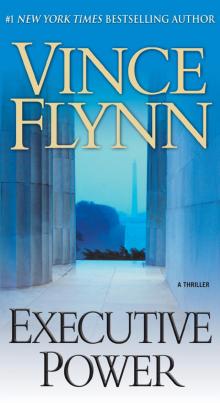 Executive Power
Executive Power Protect and Defend
Protect and Defend Term Limits
Term Limits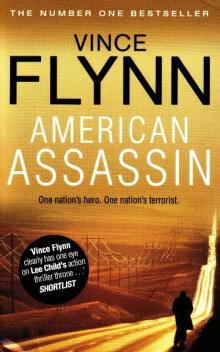 American Assassin
American Assassin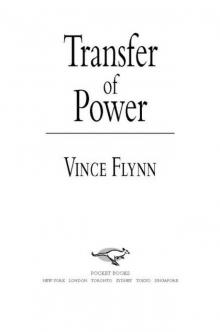 Transfer of Power
Transfer of Power Kill Shot
Kill Shot Vince Flynn Collectors' Edition 2
Vince Flynn Collectors' Edition 2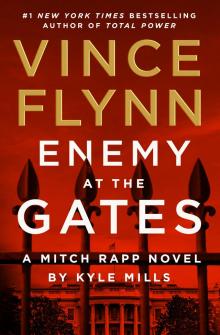 Enemy at the Gates
Enemy at the Gates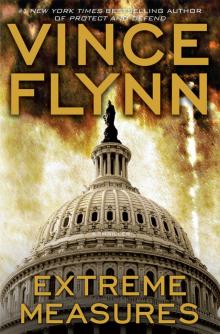 Extreme Measures
Extreme Measures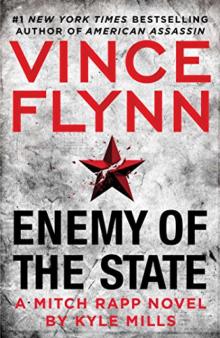 Enemy of the State
Enemy of the State Act of Treason
Act of Treason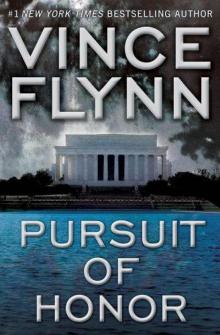 Pursuit of Honor
Pursuit of Honor The Survivor
The Survivor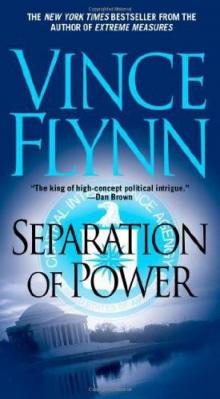 Separation of Power
Separation of Power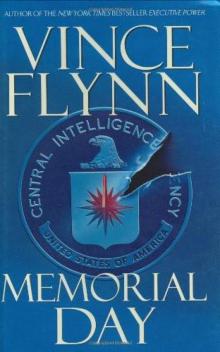 Memorial Day
Memorial Day The Last Man
The Last Man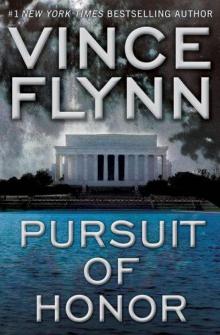 Pursuit of Honor_A Thriller
Pursuit of Honor_A Thriller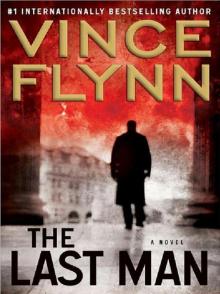 Mitch Rapp 13 - The Last Man
Mitch Rapp 13 - The Last Man Consent to Kill:
Consent to Kill: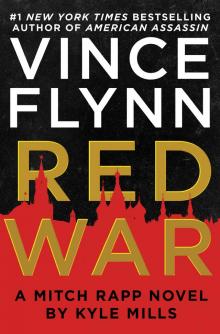 Red War
Red War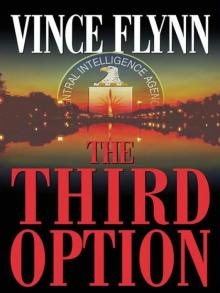 Mitch Rapp 02 - The Third Option
Mitch Rapp 02 - The Third Option Mitch Rapp 05 - Memorial Day
Mitch Rapp 05 - Memorial Day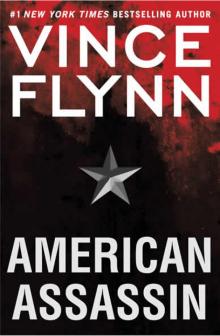 Mitch Rapp 11 - American Assassin
Mitch Rapp 11 - American Assassin Mitch Rapp 14 - The Survivor
Mitch Rapp 14 - The Survivor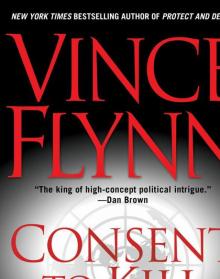 Mitch Rapp 06 - Consent to Kill
Mitch Rapp 06 - Consent to Kill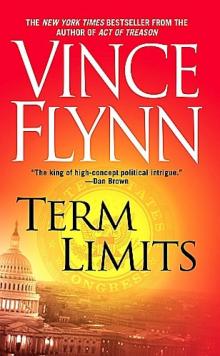 Term Limits mr-1
Term Limits mr-1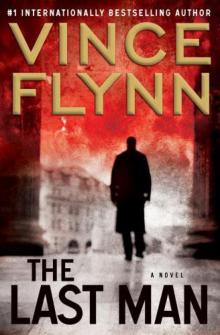 The Last Man mr-13
The Last Man mr-13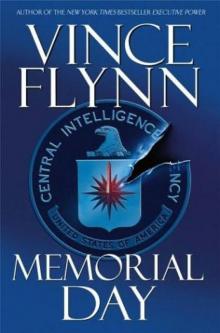 Memorial Day mr-5
Memorial Day mr-5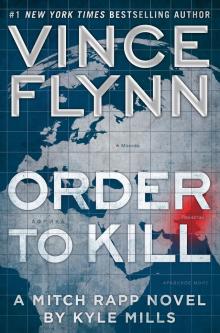 Order to Kill
Order to Kill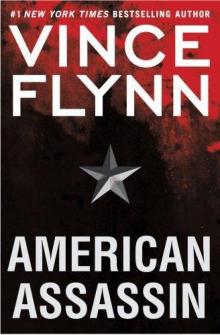 American Assassin: A Thriller
American Assassin: A Thriller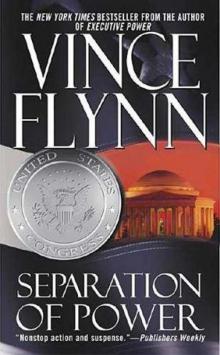 Separation of Power mr-3
Separation of Power mr-3